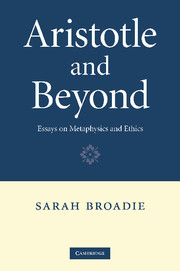Book contents
- Frontmatter
- Contents
- Preface
- Acknowledgments
- Chapter 1 Affecting and being affected
- Chapter 2 Backwards causation and continuing
- Chapter 3 From necessity to fate: An inevitable step?
- Chapter 4 Alternative world-histories
- Chapter 5 A contemporary look at Aristotle's changing Now
- Chapter 6 Nature and craft in Aristotelian teleology
- Chapter 7 Soul and body in Plato and Descartes
- Chapter 8 Aristotle and contemporary ethics
- Chapter 9 On the idea of the summum bonum
- Chapter 10 What should we mean by ‘the highest good’?
- Chapter 11 The good of practical beings: Aristotelian perspectives
- Chapter 12 Taking stock of leisure
- References
- Index of names
Chapter 3 - From necessity to fate: An inevitable step?
Published online by Cambridge University Press: 25 June 2009
- Frontmatter
- Contents
- Preface
- Acknowledgments
- Chapter 1 Affecting and being affected
- Chapter 2 Backwards causation and continuing
- Chapter 3 From necessity to fate: An inevitable step?
- Chapter 4 Alternative world-histories
- Chapter 5 A contemporary look at Aristotle's changing Now
- Chapter 6 Nature and craft in Aristotelian teleology
- Chapter 7 Soul and body in Plato and Descartes
- Chapter 8 Aristotle and contemporary ethics
- Chapter 9 On the idea of the summum bonum
- Chapter 10 What should we mean by ‘the highest good’?
- Chapter 11 The good of practical beings: Aristotelian perspectives
- Chapter 12 Taking stock of leisure
- References
- Index of names
Summary
INTRODUCTION
I begin with the ancient Stoics, end with the Aristotelians, and in between shall draw together some thoughts not ascribed to anyone in particular.
The Stoics were universal determinists. That is, they held that whatever takes place is and always has been inevitable or necessary, given its antecedent causes. This doctrine provoked one of the catchier bits of ancient reasoning, the Lazy Argument. Paraphrased for the modern ear, it goes: for any event E, (1) if the world is such that it is inevitable that E will occur, then E will occur no matter what else happens; and if the world is such that it is inevitable that E will not occur, then E will not occur no matter what else happens; but (2) (according to Stoic determinism) either the world is disposed in one of those two ways or it is disposed in the other. So (3) either way, the outcome will be whatever it will be no matter what else happens. Consequently, even if the occurrence of E is preferable to its non-occurrence or vice versa, nothing that anyone does with a view to producing the one or blocking the other can make the slightest difference. For example, if you, a sick person, are going to recover from your illness, then you will recover regardless of whether you get medical help. If, on the other hand, you are going to die from your illness, then you will die from it whether or not you get medical help.
- Type
- Chapter
- Information
- Aristotle and BeyondEssays on Metaphysics and Ethics, pp. 33 - 49Publisher: Cambridge University PressPrint publication year: 2007



